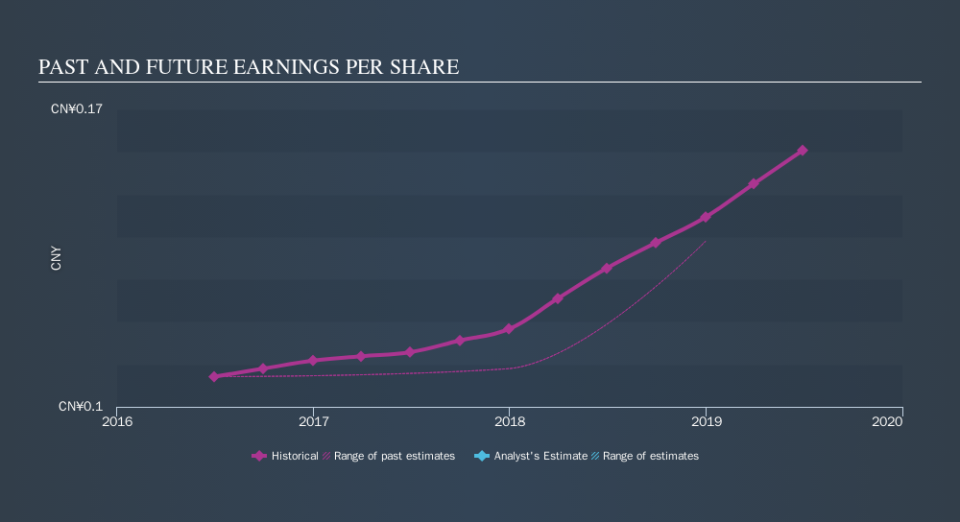Can You Imagine How BBI Life Sciences's (HKG:1035) Shareholders Feel About The 16% Share Price Increase?

By buying an index fund, investors can approximate the average market return. But if you buy good businesses at attractive prices, your portfolio returns could exceed the average market return. For example, BBI Life Sciences Corporation (HKG:1035) shareholders have seen the share price rise 16% over three years, well in excess of the market return (4.2%, not including dividends). On the other hand, the returns haven't been quite so good recently, with shareholders up just 0.8% , including dividends .
See our latest analysis for BBI Life Sciences
To quote Buffett, 'Ships will sail around the world but the Flat Earth Society will flourish. There will continue to be wide discrepancies between price and value in the marketplace...' One imperfect but simple way to consider how the market perception of a company has shifted is to compare the change in the earnings per share (EPS) with the share price movement.
BBI Life Sciences was able to grow its EPS at 14% per year over three years, sending the share price higher. This EPS growth is higher than the 5.2% average annual increase in the share price. So it seems investors have become more cautious about the company, over time.
You can see how EPS has changed over time in the image below (click on the chart to see the exact values).
It's probably worth noting that the CEO is paid less than the median at similar sized companies. It's always worth keeping an eye on CEO pay, but a more important question is whether the company will grow earnings throughout the years. Dive deeper into the earnings by checking this interactive graph of BBI Life Sciences's earnings, revenue and cash flow.
What About Dividends?
It is important to consider the total shareholder return, as well as the share price return, for any given stock. The TSR is a return calculation that accounts for the value of cash dividends (assuming that any dividend received was reinvested) and the calculated value of any discounted capital raisings and spin-offs. It's fair to say that the TSR gives a more complete picture for stocks that pay a dividend. As it happens, BBI Life Sciences's TSR for the last 3 years was 20%, which exceeds the share price return mentioned earlier. And there's no prize for guessing that the dividend payments largely explain the divergence!
A Different Perspective
Over the last year BBI Life Sciences shareholders have received a TSR of 0.8%. Unfortunately this falls short of the market return of around 4.1%. At least the longer term returns (running at about 6.2% a year, are better. Even the best companies don't see strong share price performance every year. Before deciding if you like the current share price, check how BBI Life Sciences scores on these 3 valuation metrics.
For those who like to find winning investments this free list of growing companies with recent insider purchasing, could be just the ticket.
Please note, the market returns quoted in this article reflect the market weighted average returns of stocks that currently trade on HK exchanges.
We aim to bring you long-term focused research analysis driven by fundamental data. Note that our analysis may not factor in the latest price-sensitive company announcements or qualitative material.
If you spot an error that warrants correction, please contact the editor at editorial-team@simplywallst.com. This article by Simply Wall St is general in nature. It does not constitute a recommendation to buy or sell any stock, and does not take account of your objectives, or your financial situation. Simply Wall St has no position in the stocks mentioned. Thank you for reading.

